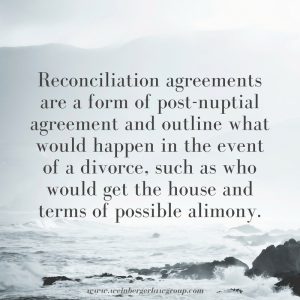Reconciling Your Marriage After Sex Addiction
 Is there life — and marriage — after one partner recovers from sex addiction? While the healing process may understandably difficult for couples seeking to put their marriage back together, one legal option — a reconciliation agreement — may give you both the security you need to start moving forward.
Is there life — and marriage — after one partner recovers from sex addiction? While the healing process may understandably difficult for couples seeking to put their marriage back together, one legal option — a reconciliation agreement — may give you both the security you need to start moving forward.
What is sex addiction? According to some therapists, when an individual’s experiences early traumatic relationships in childhood, it can result in an intimacy disorder later in life marked by high-risk behavior, sexual compulsions, infidelity or an obsession with porn. These behaviors may be a coping mechanism and a way of altering one’s mood, akin to drugs or alcohol. According to Psychology Today, “Over the course of the disease, the sex addict’s need for a ‘fix’ escalates, requiring more potent sexual and emotional experiences.”
Sexual addiction seems to be becoming more common these days, or, perhaps it is just being reported more often. We are all familiar with Anthony Weiner, the former US Representative caught in more than one “sexting” scandal. Recently his wife announced that their marriage is over. There is a debate about whether or not Mr. Weiner is a sex addict. At the same time, there is some debate in the therapeutic community as to whether or not sex addiction is legitimate. “The term ‘sex addiction’ is too broad and takes personal responsibility away from the person engaging in the sexual behavior,” clinical psychologist David Ley told New York Magazine’s the ‘Science of Us’ section.
Without question, however, many have sought and received treatment for sexual addictions and have, as a result, attempted to reconcile their relationships. For these couples, considering a formal reconciliation agreement is a smart move. Reconciliation agreements in New Jersey are a form of post-nuptial agreement and are recognized by courts here in the Garden State. Spouses generally entered into these types of agreements to outline what would happen in the event of a divorce, such as who would get the house and terms of possible alimony.
A reconciliation agreement is a contract and as such, each person needs to be giving something up in the contract. In other words there needs to be consideration given on both sides in order for the courts to find the order valid. The consideration can be something as simple as a promise to hold off on filing for a divorce. The other spouse can agree to continue treatment for their addiction or agree to attend marriage counseling.
Remember, the more specific your reconciliation agreement is, the more likely it is that a court will enforce the agreement down the road. You may want to consider details about the addiction in the agreement and the reasons why you and your spouse believe that your agreement to not file for divorce is really valid consideration. Judges have a lot of latitude in determining whether or not to become involved in enforcing an this type of agreement and some will not get involved in there is no real financial consideration agreed upon in the agreement such as division of a marital house.
Generally speaking, the judge will require your postnup to be in writing and signed by both of you. And, both spouses must have the opportunity to be represented by independent counsel. You and your spouse must also enter into the agreement voluntarily, and give each other with full financial disclosure, including attaching statements specifically describing all property, income, and all debts or other financial obligations.
Entering into a reconciliation agreement may just give you a bit more peace of mind if you are considering getting back with your recovering ex. Be sure to have any agreement reviewed by a competent attorney to ensure that, if necessary down the road, your agreement is valid and would be enforced by a judge.
If you have further questions regarding reconciliation agreements or any other type of family law issue, please contact us to schedule your initial consultation with one of our qualified attorneys experienced in pre and postnuptial agreements.
Read More:



